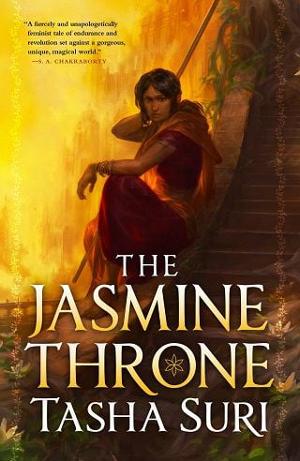Chapter 45: Bhumika
BHUMIKA
There was a burning, charred metal smell upon the air. Bhumika sat very still, surrounded by her people, and felt the drip of blood from thorns—smelled the wafts of smoke rising from the city and seeping in through the wefts of vine barring the windows.
Jeevan entered. Stood before her. Shook his head.
“Bad news, my lady.”
“Tell me.”
“Your husband lives.”
Any normal wife would have been thrilled to hear that her husband had survived. But Bhumika bit down upon her tongue until she tasted blood.
Her brother hadn’t even done her the kindness of taking this choice from her hands.
“What shall I do with him?” Jeevan asked.
“Bring him into the rose palace,” she said. “Find a room where he can be locked away. And then I’ll see to him.”
Jeevan placed Vikram in Khalida’s own room, which adjoined Bhumika’s sleep chamber. Vikram lay half-conscious upon Khalida’s sleep mat. There was a great wound gouged in his side, mirroring the one he’d received in Lord Iskar’s haveli, hastily bandaged with cloth torn from a soldier’s tunic. She wondered which poor soul had saved him, perhaps at the cost of their own life.
Bhumika sat upon the ground beside him.
“The rebels,” Vikram said. His voice was a hoarse question, bloody with fear.
“A wall of vines grew around the rose palace,” said Bhumika. “No one can enter.”
He didn’t question her words. Perhaps his injuries had temporarily addled him.
“They’ve overwhelmed the city,” he said. “The mahal—they should not have been able to break the mahal’s walls. They were not an organized military force. Nothing like Parijatdvipa can muster. How did they break the walls?”
Bhumika was silent. She watched his face twist with torment.
“So many of my men are dead,” he said.
She had not known what she would do once she saw him. But the look on his face softened her treacherous heart.
“Even my uncle’s home has burned,” she said quietly, thinking of that beautiful old haveli with a heartache. The flowers she’d grown for her uncle—deep red lilies, fed by her own heart and her own magic—had turned to ash at his bedside. She’d felt it. But there was no room for her grief, in this task or in the role she now found herself in. She could only fold it away, shelter it, until a time came when she could indulge in feeling her sorrow. If such a day ever came, of course. “There are highborn who have fled the city, and perhaps my uncle joined them. I do not believe he had the strength to do so, may soil and sky protect him. But I will imagine that he died in his bed, at peace. That is a kindness I offer myself.”
Vikram looked through her. He barely seemed to hear her voice. “I don’t understand,” he said. “I can’t. It’s almost as if…”
He fell silent. She knew then that he was thinking of the temple children.
“I’ll seek the aid of the emperor,” Vikram said eventually.
“He’ll have you removed from your post,” said Bhumika. “Or killed. And then you will have nothing.”
“I have connections,” said Vikram. “There is nowhere in Parijatdvipa that would give me a throne, certainly, and I have no heart for military campaigns any longer, but there is always work for a man who knows how to tend to power.” A pause. “Saketa, perhaps. It is a green place. Beautiful. It would make a good home for children.”
“I don’t wish to leave Ahiranya. This is my home.”
“You know nothing but Ahiranya,” he said dismissively. He tried to sit up. Gasped in pain. “You’ll learn. Where is the damnable physician?”
“I won’t leave Ahiranya,” said Bhumika. “I intend to remain here. My apologies, husband. You cannot make me leave.”
He was gray-faced with pain, his lips pinched a mottled purple.
“You’re my wife,” he said harshly. “And you carry my child.”
“Yes.” Simple words. “But I do not belong to you. And the child is still mine, my flesh and blood, and body and milk. One day that will change. All children outgrow their mothers. But for now, they remain with me, as they must.”
“No more of this, Bhumika. Call me a physician. I have work to do, if we hope to survive.”
She shook her head.
“What do you mean, no?”
Vikram had not been prepared for what those touched by the deathless waters could do. And those rebels of Ashok’s had not been prepared for her. But then, Ashok had always underestimated her. Just as Vikram had. Just as Priya had.
Fortunately, Bhumika never underestimated herself.
You should have listened to me, she thought of saying. You should have avoided escalation with the rebels. You should have known better than to throw your lot in with the emperor who burns women, who dashes down his allies, the emperor who dreams of a world purified by faith and flame.
You should have trusted the woman you married.
“I never wanted this,” she said instead. That, at least, was true. “I wanted peace. I was willing to pay the price that peace demanded, however broken that peace was. But now it’s gone, husband, and now that the rebels and your men have torn Hiranaprastha between them like dogs, I will do what is needful. I will take up the role that was once mine.”
Finally, he looked at her and saw her. The flush of her face, suffused with power. And behind her…
The thorns, coiling through the window with unnatural, winding sentience.
She saw the realization dawn in his eyes. It was a cold, pure horror, a horror that told her he had never suspected her, never feared her. Never known that his Ahiranyi highborn wife, married for politics and for her beauty, for the possibility of the child she now carried, was the kind of monster he had once sought to burn.
“You will not return to your emperor,” she said. “I am sorry for it, Vikram. But there are lives I value more than yours. And truly…” She swallowed. “Truly, I tried.”
She rose to her feet. He grasped at the hem of her sari. She stepped away before he could touch her.
“A physician,” he called after her. “Bhumika. At least that.”
He was trying to rise to his feet. She heard him groan once more in pain.
She shut and bolted the door behind her, without looking back.
Everything she had built had shattered.
Her safe identity. Her marriage. Her nation of fragile peace. She could no longer use the strength of Parijatdvipa to protect her own. It was Ahiranya’s strength she needed now. The strength of the deathless waters and their magic of root and vine.
She needed Priya.
Many of the survivors in the rose palace were very old, or very young. But some were Jeevan’s men, or guards who’d run to safety. Some were strong-armed gardeners, or cooks from the kitchens with burn-scarred and callused hands. And some were maidservants, used to the hard work of hauling water and firewood, of climbing the Hirana. And these were the people she spoke to.
She told them that not all the temple children had died.
She told them of Priya’s gifts, so like her own. She told them that the way to the waters had been found. She told them there was a chance the power that had once existed in Ahiranya could be restored. She gave them more honesty than she had ever afforded Vikram.
“And if you come with me, or guard the rose palace for my return,” she said. “If you act as my retinue and my loyalists, if you help me find my fellow temple child, you will ensure that Ahiranya has hope. That it may survive, still, even if the empire turns upon us. So.” She looked between them. “Will you come?”
“We all know the tales of the temple council,” one cook said gruffly. “Some of us who were city born and raised met them in person. We know what was done to them. The children.” He looked down at his hands. Raw now, not just from cooking scars, but from handling a bow. “I’ll come.”
“I want to come too,” said the maidservant Sima. A few other voices joined in, offering their presence on the journey or their arrows on the palace’s walls.
“This won’t be an easy journey for any of us,” she said, once all the volunteers had spoken and roles had been delegated. “And to those of you who remain—I will pray every night for the strength of my thorns to hold.”
There was no rest after that. Only planning, and more planning, and then when she finally found a moment alone, to close her eyes, she heard footsteps. Looked, and saw the child with the rot upon him standing before her, a hopeful look in his eyes.
“Rukh,” she said. “What do you want?”
“I’m coming with you,” he said. “Aren’t I? You made me promise to serve you. So I must come. I need to help you find her.”
The journey ahead of them was not suitable for a child. She should have refused him. But leaving him behind would crush some of the hope in him. And she found she could not do that.
“Yes,” she said. “Go and pack your things.”
This journey was no place for her either. She could not even imagine her own child yet. When she tried to, she saw—nothing. Only felt the alienness of her own body, the tug and pain that pooled at the base of her spine. And yet she loved them, because they were her own, and breathed and dreamt with her.
“You deserve better than this,” she murmured, moving her hand back and forth over the curve of her stomach. Back and forth. “But here we are. The work must be done.”
 Fullepub
Fullepub 



